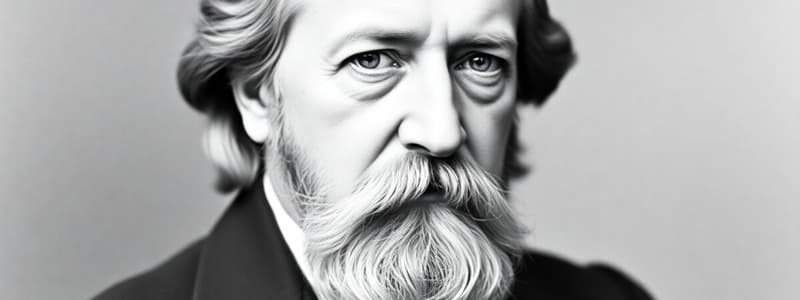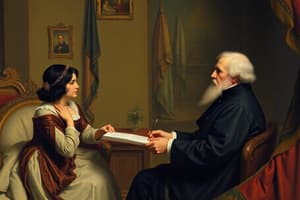Podcast
Questions and Answers
Wagner's move to Paris in 1839 was primarily motivated by:
Wagner's move to Paris in 1839 was primarily motivated by:
- the need to escape mounting financial obligations. (correct)
- a desire to study composition with renowned French musicians.
- a commission to compose a new opera for the Paris Opera.
- an invitation to conduct a prestigious Parisian orchestra.
Tristan and Isolde, a significant work by Wagner, was completed in 1859 but notably:
Tristan and Isolde, a significant work by Wagner, was completed in 1859 but notably:
- not performed publicly until several years after its completion. (correct)
- immediately premiered to widespread critical acclaim in Bayreuth.
- initially rejected by publishers due to its unconventional harmonies.
- written during his time as conductor at the royal court in Dresden.
Wagner's unique approach to opera is best characterized by his creation of 'music dramas', distinguished by:
Wagner's unique approach to opera is best characterized by his creation of 'music dramas', distinguished by:
- a reliance on traditional operatic forms with spoken dialogue.
- a strict adherence to classical music forms, avoiding experimentation.
- the integration of poetry, drama, music, and visual arts. (correct)
- operas based exclusively on historical events and figures.
Despite the recognition of his musical genius, opinions on Wagner's music are described as 'varying', likely due to:
Despite the recognition of his musical genius, opinions on Wagner's music are described as 'varying', likely due to:
Wagner's relationship with Franz Liszt was multifaceted, encompassing roles such as:
Wagner's relationship with Franz Liszt was multifaceted, encompassing roles such as:
Wagner's early musical development is characterized by the fact that he:
Wagner's early musical development is characterized by the fact that he:
The commission and support from the King of Bavaria in 1862 were crucial for Wagner because they:
The commission and support from the King of Bavaria in 1862 were crucial for Wagner because they:
Wagner's opera Reinzi, which marked his first significant public success, premiered in:
Wagner's opera Reinzi, which marked his first significant public success, premiered in:
Wagner credited Ludwig van Beethoven's music with a profound impact, specifically stating that it:
Wagner credited Ludwig van Beethoven's music with a profound impact, specifically stating that it:
Wagner's decision to be buried next to his dog, Russ, in his Bayreuth house garden, most likely reflects:
Wagner's decision to be buried next to his dog, Russ, in his Bayreuth house garden, most likely reflects:
Flashcards
Richard Wagner
Richard Wagner
A German composer known for his music dramas and operas.
Born in 1813
Born in 1813
Wagner was born in Leipzig, Germany as the youngest of nine children.
Marriage to Minna Planer
Marriage to Minna Planer
Wagner married Minna Planer in 1836; their relationship was tumultuous.
First Successful Opera
First Successful Opera
Signup and view all the flashcards
Exile in Switzerland
Exile in Switzerland
Signup and view all the flashcards
'Tristan and Isolde'
'Tristan and Isolde'
Signup and view all the flashcards
Return to Germany
Return to Germany
Signup and view all the flashcards
Influence of Beethoven
Influence of Beethoven
Signup and view all the flashcards
Franz Liszt's Influence
Franz Liszt's Influence
Signup and view all the flashcards
Wagner's Music Drama Style
Wagner's Music Drama Style
Signup and view all the flashcards
Study Notes
Richard Wagner - Musician's Biography
- Born in Leipzig, Germany, 1813, youngest of nine children
- Largely self-taught in music
- Married Minna Planer in 1836; relationship was long and stormy, ending in 1862
- Moved to Paris in 1839, worked as a music journalist due to poverty
- His first opera, Rienzi, premiered in 1842, followed by The Flying Dutchman in 1843
- Became conductor at the royal court in Dresden
- Left Germany in 1849 after joining rebel republicans; long exile in Switzerland
- Completed Tristan und Isolde in 1859, but it was considered unplayable until 1865.
- Returned to Bavaria in 1862, comfortable villa near Munich, and finished major work, Die Ring des Nibelungen (The Ring Cycle)
- Died 1883, buried near faithful dog, Russ, in Bayreuth garden
Wagner's Influence on Opera
- Reinvented opera as music drama, combining poetry, drama, music, and art
- First composer to create every aspect of his music dramas, composing music, creating plot and characters, and writing all words, without collaborating with lyricists.
- Began career as playwright and poet, then turned to music after an illness
- His work shows great musical and dramatic vision, although opinions about it vary.
Studying That Suits You
Use AI to generate personalized quizzes and flashcards to suit your learning preferences.




